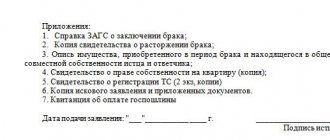It would be wrong to consider issues related in one way or another to claims for division of an apartment solely through the prism of property disputes between former spouses. Files in .DOC: Form of claim for division of an apartmentSample statement of claim for division of an apartment
Any co-owner, including former spouses, children, grandchildren, etc., has the right to file a claim for division of an apartment. The main condition for this is to have ownership of a share in the apartment.
Grounds for writing a statement of claim
In modern domestic realities, an apartment is an extremely expensive investment, which not everyone can make on their own. Therefore, as a rule, a living space has several owners.
Ownership rights of several people to one home may arise when:
- purchase (construction) of an apartment or house by spouses during marriage, including in the case of purchase with the help of a mortgage loan. In this case, the co-owners are the spouses;
- purchase of an apartment or house by spouses during marriage using maternity capital. In this case, not only the spouses, but also the child will be co-owners;
- inheritance by several heirs of residential premises or shares in it.
The question of dividing an apartment usually arises simultaneously with the deterioration of relations between the owners, and then the option to get out of the conflict will be:
- section with accompanying exchange of apartments;
- division with the subsequent sale of the apartment and division of the proceeds between the owners;
- division of the apartment in kind with allocation to each of the owners of their own, figuratively speaking, corner in the apartment.
Regardless of which of the above results will be most beneficial for the owners, they will have to start with a statement of claim for the division of the apartment.
Of course, there are also ways to resolve the dispute out of court, for example, with the agreement of one of the co-owners to pay compensation to the other co-owners in the form of the value of their share and with the mutual consent of the co-owners to receive compensation and leave the apartment. But, as practice shows, such agreements are very rare in the event of a conflict situation.
Limitation of actions
According to the general rule provided for by the Civil Code of the Russian Federation, the statute of limitations is three years from the moment when the party to the dispute learned or should have learned about the violation of its rights. This rule is written down in Part 1 of Article 200 of the Civil Code of the Russian Federation.
The starting point for the three-year period in cases of division of property is considered to be the moment of termination of marriage:
- the date of entry into force of the court decision on divorce;
- the date of entry by the civil registry office in case of extrajudicial divorce.
However, the position of the Supreme Court, reflected in paragraph 19 of the Resolution of the Plenum of November 5, 1998 N 15 (as amended on February 6, 2007), states that the beginning of the limitation period in cases of division of property will be the moment when the party to the dispute learned about the violated right .
Example: The former spouses did not resort to division of property for more than three years from the date of divorce and did not make any demands on each other. Five years later, the ex-wife turned to her husband with a demand to divide the apartment acquired during marriage and was refused, as a result of which she was forced to go to court. It is the moment of refusal (i.e. violation of the right) that will be considered the beginning of the limitation period. When dividing property in a legal marriage, the statute of limitations rule does not apply - the parties have the right to declare the division of property at any time, regardless of the period of marriage.
How to file a claim
We usually recommend using one of the standard claim templates presented on the website. Of course, the website also has a template for a statement of claim for the division of an apartment. But still, in this case, we would recommend contacting a qualified lawyer who will take care of drawing up the application.
The fact is that claims for division of real estate belong to the category of claims that are subject to increased requirements in terms of legal technique. This is due to the fact that the claim for division of an apartment must be formulated very clearly:
- the plaintiff's wishes;
- information about shares in property rights of other persons;
- information about documents evidencing the right to shares;
- the plaintiff’s demands depending on the possibility of division in kind;
- options for division if division in kind is not possible;
- requirements regarding the procedure for use in the event of division in kind;
- requirements for establishing an easement in the event of division in kind, etc.
If the statement of claim is unclear or does not contain all the criteria by which the court can make a division, then the statement of claim will be refused. Templates, no matter how well they are drawn up, cannot provide for all possible situations related to the division of an apartment.
It is possible that no matter how much you rely on your own strength and rely on templates, you will still have to eventually turn to a lawyer.
If, nevertheless, you decide to try to draw up a claim yourself, we recommend that you adhere to the following scheme for drawing it up:
- the name of the judicial authority to which the claim is sent;
- Full name and actual place of residence of the plaintiff;
- Full names and actual places of residence of all co-owners and third parties;
- name of the claim;
- a statement of the background, that is, the course of events that led to the emergence of the right of ownership of housing for the plaintiff and defendant (marriage, use of maternity capital, inheritance, etc.);
- information about the apartment itself and its cost;
- an indication of the share claimed by the plaintiff;
- presentation of the option for dividing the apartment;
- the plaintiff’s actual request to the court for the division of the apartment with the definition of shares and the option for their allocation (in kind, with payment of compensation, establishment of the procedure for use, establishment of an easement, etc.);
- listing of documents attached to the statement of claim;
- signature of the plaintiff and date of filing the claim.
What to consider when dividing property after divorce
If a marriage contract was not concluded between the spouses, then everything acquired during the marriage after the divorce must be divided equally. As a general rule. In this case, the court does not take into account either the nature of the spouses’ activities or the possibility of financial investments in the acquisition of valuable property. When one of the spouses, for example, does not work. Or receives significantly less income.
Personal belongings (except for luxury items and significant value), property received as a gift or as an inheritance are not divided. Everything that belongs to the child is also not subject to division. And it belongs to a minor. What each spouse acquired after the divorce and before the marriage is not included in the community property subject to division. Therefore, in some cases it is extremely important to establish the date of actual termination of the family relationship.
Taking into account the prevalence of maternity capital, we consider it necessary to emphasize: if the apartment was purchased by spouses immediately with registration of shares (for example, 1/2), then it makes no sense to prove the investment of personal funds (donated, accumulated before marriage, etc.) . As a rule, the courts clearly consider the existence of an agreement to purchase housing in shares as proven. But each case has its own nuances; here it is necessary to assess the situation from the point of view of the availability of evidence.
On the issue of the statute of limitations. The three-year period for filing a claim does not begin to run from the date of divorce or dissolution of marriage. And from the date when joint property was threatened. That is, for example, one of the spouses (for whom it is registered) decided to dispose of it - sell it, donate it, exchange it, etc.
The cost of the apartment as the cost of the claim
The division procedure, the amount of compensation and the amount of state duty depend entirely on the cost of the disputed apartment, so the claim must contain reliable information about its price. The cost of the share in the housing claimed by the plaintiff will be the price of the claim. For example, if the cost of an apartment is 1,000,000 rubles, the cost of the claim will be 500,000 rubles if the plaintiff claims 1/2, or 333,000 if he claims 1/3, etc.
The cost of the apartment can be set:
- based on the cadastral assessment;
- based on market value;
- based on the assessment of an appraiser.
Differences
To compare two forms of transaction with each other, you need to clearly see their similarities and differences. Spouses have the right to use any option, both are permitted by law. The only thing is that the agreement on the division of property is usually concluded later than the marriage contract. And it is used during divorce to simplify the procedure when the parties have already discussed everything.
| Criteria | Settlement agreement | Marriage contract |
| Form, need to notarize | Only written, notarized certification | Only written, you can do without a notary |
| Who concludes | Spouses/ex-spouses, cohabitants | Persons planning to marry/legal spouses |
| Moment of conclusion | Can be concluded during marriage, during divorce and after it | Can be concluded before marriage registration or at any time after the wedding |
| Selected ownership modes | A regime of common shared / separate ownership is established | Regime of common/common shared/separate property |
| Subject of the agreement | Property already owned | For current property and future |
| Other differences | It is possible to establish what goes to the common children by re-registering the object of the transaction to the children at a specified time. | Spouses can distribute financial obligations among themselves to support each other. Determine what and who gets it immediately after acquisition. |
| Distribution of debt obligations and other conditions | Includes only property relations of the parties |
Both forms of transaction contain the rights and obligations of the participants regarding joint property. It is necessary to take into account not only assets, but also debts, for example, an outstanding loan. During a divorce, you cannot “forget” it; you cannot simply divide it in two. Bank participation is required. If there are two borrowers and the spouses initially paid equally, then each will receive half of the collateral property after the final repayment of the mortgage. Until then, the formal owner is the bank.
Subject of regulation
The marriage contract applies to the current and future lives of the parties. According to the law, it can be used to regulate:
- Distribution of family expenses down to the smallest detail. For example, who pays for food, who pays for utilities, minor repairs and clothing. The cash register will be shared or everyone will manage their own income.
- Changing the regime of ownership of property of spouses described in the legislation. Participants in the transaction can decide which regime is most beneficial to them. For example, shared, or common. The rules will apply to everything purchased by the couple, from household appliances to real estate. You can specify the ownership category for each item separately. The apartment is shared, but the laptop is personal.
- Obligations for financial support of partners during marital relations and after divorce.
- Establishment of rights and obligations to dispose of property that exists and will be acquired.
- Methods for spouses to participate in each other’s business transactions, and the procedure for distributing earnings between them.
- How the family's assets will be divided in the event of a divorce, what will go to each party and what to the children.
- Other property rights and obligations.
The contract can only contain information of a material nature. For example, the right to own joint property, financial security for the family, payment of debts. There should be no other conditions in the contract, such as an obligation to remain faithful or change religion after the wedding.
The subject of the settlement agreement on the division of property is all assets acquired by the family during the period of legal marriage:
- real estate (residential and non-residential);
- bank deposits;
- spouses' income;
- shares in credit institutions and organizations;
- movable property (transport, furniture);
- securities;
- financial assistance - subsidies, pensions;
- income from intellectual activity of partners;
- shares from mutual funds/other organizations.
Except for those received as a gift or as an inheritance by one of the spouses. The other half can claim this if the gift or inherited property was subsequently improved with investment from the family budget. Then, through the court, the object can be recognized as part of the property acquired jointly. When dividing joint property by reaching a peaceful agreement, the parties decide for themselves what to divide and how. The donee or heir has the right to include what was received as a result of a gratuitous transaction into the common “cauldron” of his own free will.
Design features
The conclusion of a marriage contract between the parties is described in detail in the legislation. Stakeholders only need to follow the instructions and understand the importance of the decision being made:
- The parties to the transaction agree on the terms of the contract in detail. This happens before or after marriage.
- Preparation of a plan for a future agreement. You can draw it up yourself on paper, listing all aspects point by point. Or entrust it to an experienced lawyer.
- Collection of documents. To conclude a marriage contract, the parties will need:
- three copies of the finished document;
- marriage certificate (if the wedding has already taken place);
- title papers for the property described in the contract;
- passports of the parties;
- funds to pay for notary services.
It is not necessary to involve a specialist when drawing up and concluding a contract. However, it will help to avoid many difficulties, because the lawyer will check the legal compliance of the contract and certify it. At the same time, he will explain to the parties the significance of their actions.
- Choosing a suitable notary.
- Visit to a law office. A specialist will study the contract plan, help you finalize it, and check the attached documents. The parties will then sign the agreement in his presence.
On average, notary services cost 5,000 – 10,000 rubles, if it includes drawing up an agreement for the parties’ current property and what they will acquire in the future. An example of a marriage contract can be downloaded here.
The participation of a notary is not necessary, but rather desirable to ensure the legal purity and safety of the procedure.
The procedure for concluding an agreement on the division of joint property is in many ways similar to signing a marriage contract. The only thing is that after changes in legislation in 2021, the participation of a notary in the transaction has become mandatory:
- Citizens must visit a notary and show him the marriage certificate/divorce certificate to confirm their legal relationship.
- Together they work on the content of the document, which should reflect the intentions of the parties regarding the joint property acquired by them during the period of legal marriage.
- The specialist explains to clients the legal significance of their actions and the expected result. That the document will be taken into account by the judge, the division of property will take place according to the procedure established in it.
- If clients have not changed their mind, they sign the agreement in the presence of a lawyer, and he certifies the paper.
- You can pay for notary services in 2 ways:
- depending on the value of the subject of the transaction - 0.5%, if the total amount is less than 300 rubles, clients pay 300, if above 20,000 rubles, then pay - 20,000;
- fixed rate 5,000 – 15,000 rubles.
Some specialists set their own prices. It depends on the location of the office; in large cities it is more expensive.
Changes can be made to the content of the contract and agreement after signing and certification (if any). If both parties agree with them.
Legal force
The Family Code regulates the procedure for dividing the common property of spouses through the conclusion of a settlement agreement. The content of the regulations establishes the nuances of the procedure: the subject of the transaction (large items of great value, real estate, transport, financial savings), the time of conclusion (during the marriage, during divorce proceedings or after it) and the procedure for the distribution of property that will go to each of the spouses after divorce. The document acquires legal force after it is signed by the parties and certified by a notary. It is taken into account by the court.
A marriage contract can be drawn up without the presence of a lawyer, provided that all legal requirements are met. It acquires legal force after the wedding, if concluded earlier and immediately after signing by the parties, if married.
Arbitrage practice
Legal proceedings are initiated by one of the parties to the transaction when the other violates the terms. The second purpose is to invalidate the agreement. For example, under the terms of a prenuptial agreement, all assets acquired by a couple during marriage become the personal property of the spouse. The husband is left with nothing. At first, the man could agree, but later, after reflecting on the prospects, he wanted to make changes to the content of the agreement. However, the woman was against it. Such disputes are resolved through court, where the arguments of each side will be heard.
Having examined the case, the court ruled:
- If, according to the provisions of the contract, any assets acquired by the partners during the period of the marriage relationship are transferred to one of them, then he is the legal owner.
- The contract cannot be considered an enslaving deal that puts one of the participants in a deliberately unfavorable position.
- The plaintiff does not have evidence of his disadvantageous position as a result of the conclusion of the disputed contract.
- The deterioration of the plaintiff’s financial situation cannot be considered a “significant change in life circumstances.”
Experts advise contacting a notary when concluding transactions of this nature, because It is difficult for people to imagine the full consequences of the decisions they make. Especially in terms of a marriage contract, because it specifies the procedure for disposing of property by spouses not only for the current, but also for the future. The courts will always rely on the voluntary consent of the people who signed the agreement.
State duty amount
Disputes regarding the division of an apartment belong to the category of property disputes, and therefore are subject to state duty according to the following schedule:
- if the claim price is from 100 to 200 thousand – 3,200 rubles plus 2% of the claim amount over 100,000 rubles;
- if the claim price is from 200,000 to 1,000,000 rubles – 5,200 rubles plus 1.5% of the claim amount over 200,000 rubles;
- if the value of the claim is over 1 million rubles - 13,200 rubles plus 0.5% of the amount of the claim over 1 million rubles.
The total amount of state duty cannot exceed 60,000 rubles.
Which court?
Both magistrates and district courts deal with cases of division of joint property between spouses.
| Where to file a claim for division of property? | |
| To the world court |
|
| To the district court |
|
If the division of common property is combined with a claim within the jurisdiction of the magistrate - for example, for divorce, then the claim in any case will need to be filed in the district court.
Exactly the same rule will be applied if, based on the amount of divisible property (less than 50 thousand), the claim must be filed with a magistrate, but the spouses simultaneously, during a divorce and division of property, resolve a dispute about children within the jurisdiction of the district court.
To exclude the influence of the human factor - not always motivated wishes to finalize the claim from court employees - it is recommended to send a package of documents by mail, having consulted in advance with a lawyer about its compliance with the requirements of the law.
What to choose: pros and cons
| Trade name | Behind | Against |
| Marriage agreements | It is better to conclude an agreement in cases where:
| You should refuse to enter into a marriage contract:
|
| Partition agreements | It is suitable for those spouses or former spouses who:
| You should refrain from concluding a separation agreement:
|







